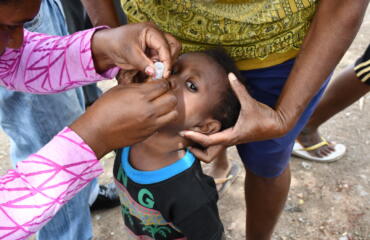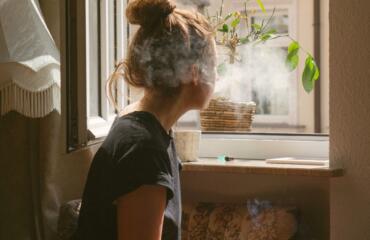Prior to the COVID-19 pandemic, Eleanor Van Dyk had never used hand sanitiser on her eighteen-month-old daughter, and bath-time generally meant a soak and a bit of a scrub in warm water, no soap.
This routine reflected a carefully considered albeit laissez-faire approach to household and personal hygiene. Van Dyk, 33, a senior pharmacist at Melbourne’s Alfred Hospital, has a keen understanding of the crucial role of microbes in immune system development, especially in babies and children, and of how the overuse of antibacterial and sanitising products can spur microbial resistance.
Then along came the novel coronavirus, and health messaging around the merits of letting our mostly harmless and beneficial microbial bugs run free collided with strategies to contain the pandemic. In the Van Dyk household as in so many others, liberal use of soaps, sanitisers and disinfectants has become a crucial frontline defence against COVID-19.
![Like many parents, Eleanor Van Dyk is wary of returning to her pre-COVID practices. “I don’t necessarily mind if [my daughter] gets dirty or touches other children, dogs or things in shops at this stage, but you can tell it’s socially disapproved.”](https://the-citizen-web-assets-us.s3.amazonaws.com/uploads/2020/11/17115432/Mircobiome1-copy.jpg)
Like many parents, Eleanor Van Dyk is wary of returning to her pre-COVID practices. “I don’t necessarily mind if [my daughter] gets dirty or touches other children, dogs or things in shops at this stage, but you can tell it’s socially disapproved.”
While not questioning the imperative of rigorous hygiene in combating the spread of the deadly coronavirus, leading microbiologists are wondering about the long-term repercussions of this super-sanitised moment of human history.
The problem is “a lot of the time we only hear of the bad bacteria, viruses, and parasites. But 95 per cent of [them] that we encounter are good or neutral”, says molecular and biomedical PhD candidate Caitlin Selway of Adelaide University.
But antibacterial soaps, disinfectants and alcohol-based sanitisers – the latter being a critical part of the coronavirus response – don’t discriminate between good and bad bugs.
“If we get rid of the good (bacteria), they cannot defend the body against the bad ones,” says Selway. And super-sanitising our environment and encounters with other creatures reduce our exposure to a whole range of useful bugs.
In the past decade, there has been an explosion in scientific and medical appreciation of the value of microbial exposure and the crucial, powerful role invisible bacteria, fungi and viruses play in shaping health and immunity. Impacts have been documented in areas from mental health to obesity.
Experts are especially concerned about the pandemic’s youngest generation; as babies and young children have the most to gain, or alternatively lose, from limiting exposure to the microbial world.
Prior to the pandemic, Selway was researching how children living in so-called “cleaner” environments are less exposed to a diverse range of bacteria, which is potentially causing “long-term adverse health outcomes”, such as developing asthma and allergies.
She now worries that post-lockdown environments will be even “cleaner”.
Selway believes COVID-19 may contribute to “increased prevalence of immune-related diseases” in the long-term.
She expects over-sanisation hygiene trends to outlive the pandemic, saying that we need to find a “correct balance” between educating the public on the benefits of exposing children to the majority of bacteria while observing appropriate sanitation, where required.
Dr Kirsten Perrett, from the Centre for Food and Allergy Research at Murdoch Children’s Research Institute, says regular interaction with new bacteria and other bugs can benefit children. “We see reduced levels of allergies in children with regular exposure to dogs, siblings, childcare, and living on farms or in rural areas.”
Bacteria make up the largest portion of a child’s microbiome, the term given to the invisible community of bacteria, viruses, fungi and other microscopic living things living in or inside them.
And for microbiomes, the richer and the more diverse the better, says Australia’s leading microbiology gut expert, Dr Phil Hugenholtz, of the Australian Centre for Ecogenomics at the University of Queensland.
What most people don’t realise, he says, is that humans and microbes have evolved alongside each other for millions of years and formed a very harmonious relationship.
Humans carry around some 10 trillion more bacteria cells within and upon their bodies than human cells. These play a critical role in our health and survival, explains Dr Hugenholtz.
The rampaging field of gut microbiology has made huge breakthroughs in understanding how our microbiomes influence our health in the past decade. The bacteria in your gut weighs a whopping one or two kilos. That’s roughly the same weight as your brain and scientists like Dr Hugenholtz think they might be nearly as vital.
“There’s a lot of connection between the gut and the brain,” he says. For instance, there are certain gut microbes found in people with anxiety and depression that are absent in healthy individuals.
Besides mental health, the field has revealed other curiously strong links between gut bacteria and a number of health and wellbeing factors, such as intestinal disorders, obesity and heart disease.
It’s also become clear that the window for cultivating a healthy and diverse gut microbiome is small and a child’s first three years are the most crucial. Hence the hyper clean world of the COVID-19 generation of toddlers could have lasting, detrimental effects.
“I think additional use of sanitiser will certainly limit transmission of not only COVID-19 and viruses, but also of microorganisms in general,” says Dr Hugenholtz.
He hopes COVID-19 won’t bring back the “old view” that bacteria is bad and will make you sick, adding “we really shouldn’t be using antibacterial soaps”.
“We’ve evolved to try and seed ourselves with microorganisms,” says Dr Hugenholtz. This is evident with children’s “natural behaviours” such as playing amongst themselves or outside both of which naturally passes bacteria back and forth.
But the global pandemic has isolated children, confined them indoors, and doused them in soap and sanitizers.
“The bottom line is that if you keep things too clean, then your immune system isn’t calibrated as it should be naturally,” says Dr Hugenholtz. “If we intervene all the time by washing [children’s] hands and stopping them doing their natural behaviour, we’re sort of interfering with the natural process”.
How the “new normal” will influence generation lockdown’s vital window of microbiome exposure is still unknown. Dr Hugenholtz says “we’ll have to wait for a little while to see if there is an actual uptick in these effects”.
Like many parents, Van Dyk is wary of returning to her pre-COVID practices. “I don’t necessarily mind if [my daughter] gets dirty or touches other children, dogs or things in shops at this stage, but you can tell it’s socially disapproved”.
She says most parents she knows are practising strict social distancing and hygiene routines, either unwittingly limiting their children’s exposure to beneficial microbes, or believing that this is the lesser risk in the context of the pandemic.
Dr Hugenholtz’s advice for parents navigating COVID-19 mandates is simple: let children “play in the dirt and get dogs to lick them”. He calls dogs the best of both worlds as they’re poor transmitters of the deadly coronavirus but great sources of beneficial environmental bacteria.




